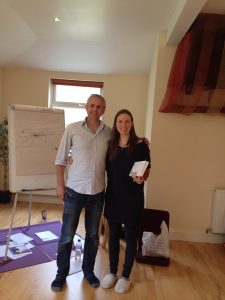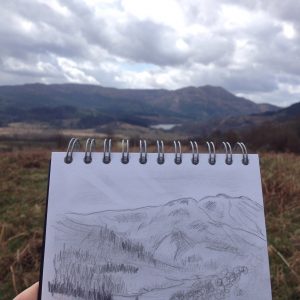I Love Me Weekend
The other weekend I went on a wonderful course taught by Dr David Hamilton. It was called “I Love Me” and we delved deeply into self-love and the science of self-love. If you’d like to read more about this, then I highly recommend I Heart Me (Hay House, 2015) by Dr David Hamilton, which covers some of what we learnt on the weekend course.
 I first came across David’s work a few years ago – actually through my Mum who had one of his books – and I had the pleasure of hearing him speak at the I Can Do It Hay House conference in Glasgow in 2013.
I first came across David’s work a few years ago – actually through my Mum who had one of his books – and I had the pleasure of hearing him speak at the I Can Do It Hay House conference in Glasgow in 2013.
Last year I attended David’s Integrating Science Coaching course and thoroughly enjoyed it. I learnt loads and made some lovely connections with the other attendees as well as with David.
There I had bought the I Heart Me book, and since then I’ve read it twice. When I saw that David was going to be at Lendrick Lodge teaching material based on the book, I signed up. There is something about learning in-person with a teacher rather than from a book. Books are great – I love them! – however, I know that I can learn only intellectually that way but I don’t always learn experientially. If you know what I mean! I find value in applying concepts, tools and techniques to figure out if they work for me or not. Experience for me is therefore key.
In addition to the course, the setting at Lendrick Lodge is stunning. Situated in the Trossachs, I was immersed in nature with minimal mobile reception and no wifi connection. It was a chance to unplug and connect with nature instead. I drove up from Edinburgh on Friday and arrived at lunch time so I could take advantage of the surroundings: going for a walk in the hills as the paths were on their doorstep. I spent about 3.5 hours walking, exploring, sitting and sketching, bird watching and being. Afterwards, I felt restored and re-energised.
The course started Friday evening and finished Sunday afternoon. We covered a lot and what I love most about David’s teaching is how he uses science (e.g. quantum physics, biology, etc) and research to convey the effectiveness of the tools he was teaching. As well as sharing his own experiences of using them! He approached the subject of self-love from a few different angles and approaches so that you could find the one(s) that suited you most. David defines self-love as an inner sense of worthiness. It was an interactive workshop so we got to use some of these techniques there and then.
 The reason why I was keen to learn more is because self-love, or as David puts it, an inner sense of worthiness, affects all areas of our lives. If you have low self-love and low self-worth you may not go for the opportunities that excite you. People may walk all over you. You may put yourself and your needs last and burn out. It can affect your creativity.
The reason why I was keen to learn more is because self-love, or as David puts it, an inner sense of worthiness, affects all areas of our lives. If you have low self-love and low self-worth you may not go for the opportunities that excite you. People may walk all over you. You may put yourself and your needs last and burn out. It can affect your creativity.
As a result, I have gained some more tools that I can put in my toolbox to use with my coaching clients as well as in my own personal life to grow my self-love and self-worth; things that I have been focusing on in recent years and in particular the recent months. In my own experience, focusing on well-being and self-worth first has been making a big difference to the quality of my life and giving me the energy and confidence to (continue to) create a life I love and one that is congruent with who I really am. It has also made a positive impact on my business.
I am looking forward to integrating this experience and knowledge, and exploring it further! I’ll hopefully share more in due course.
In the meantime, some of my personal takeaways include:
- We have learned how to feel about ourselves. So we can un-learn and re-learn a better way of being and feeling about ourselves. Our brains are not as hard-wired as we have been led to believe.
- Insights must be followed up with behaviour to make change stick (although sometimes there are exceptions to the rule). Consistency is key. Also, knowing why you are doing what you’re doing and doing it on purpose increases the power of the technique or habit.
- The acceptance paradox: as soon as you accept yourself where you are, how you are, and who you are, then you’re more likely to make changes that serve you. You’re coming at change from a different mindset, one that says “I am already enough” instead of “I am not enough”. Changes come from a loving perspective rather than from a fearful one.